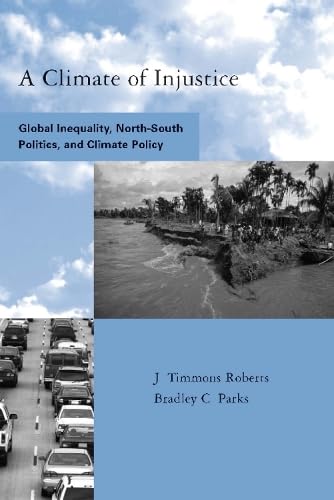Items related to A Climate of Injustice: Global Inequality, North-South...
A Climate of Injustice: Global Inequality, North-South Politics and Climate Policy (Global Environmental Accord: Strategies for Sustainability and Institutional Innovation) - Hardcover

The global debate over who should take action to address climate change is extremely precarious, as diametrically opposed perceptions of climate justice threaten the prospects for any long-term agreement. Poor nations fear limits on their efforts to grow economically and meet the needs of their own people, while powerful industrial nations, including the United States, refuse to curtail their own excesses unless developing countries make similar sacrifices. Meanwhile, although industrialized countries are responsible for 60 percent of the greenhouse gas emissions that contribute to climate change, developing countries suffer the "worst and first" effects of climate-related disasters, including droughts, floods, and storms, because of their geographical locations. In A Climate of Injustice, J. Timmons Roberts and Bradley Parks analyze the role that inequality between rich and poor nations plays in the negotiation of global climate agreements. Roberts and Parks argue that global inequality dampens cooperative efforts by reinforcing the "structuralist" worldviews and causal beliefs of many poor nations, eroding conditions of generalized trust, and promoting particularistic notions of "fair" solutions. They develop new measures of climate-related inequality, analyzing fatality and homelessness rates from hydrometeorological disasters, patterns of "emissions inequality," and participation in international environmental regimes. Until we recognize that reaching a North-South global climate pact requires addressing larger issues of inequality and striking a global bargain on environment and development, Roberts and Parks argue, the current policy gridlock will remain unresolved.
"synopsis" may belong to another edition of this title.
Review:
Synopsis:
In their superb contribution to scholarly and political debates about the future of international efforts to cope with climate change, J. Timmons Roberts and Bradley C. Parks offer a carefully developed, richly documented, and convincingly supported account of the origins, dynamics, and implications of the current North-South impasse.
--International Environmental AgreementsThis work is an examination of the role that inequality plays in shaping post-Kyoto prospects for a North-South global climate pact; with statistical and theoretical analysis and case studies of recent climate-related disasters. The global debate over who should take action to address climate change is extremely precarious, as diametrically opposed perceptions of climate justice threaten the prospects for any long-term agreement. Poor nations fear limits on their efforts to grow economically and meet the needs of their own people, while powerful industrial nations, including the United States, refuse to curtail their own excesses unless developing countries make similar sacrifices. Meanwhile, although industrialized countries are responsible for 60 percent of the greenhouse gas emissions that contribute to climate change, developing countries suffer the "worst and first" effects of climate-related disasters, including droughts, floods, and storms, because of their geographical locations. In "A Climate of Injustice", J. Timmons Roberts and Bradley Parks analyze the role that inequality between rich and poor nations plays in the negotiation of global climate agreements.Roberts and Parks argue that global inequality dampens cooperative efforts by reinforcing the "structuralist" worldviews and causal beliefs of many poor nations, eroding conditions of generalized trust, and promoting particularistic notions of "fair" solutions. They develop new measures of climate-related inequality, analyzing fatality and homelessness rates from hydro-meterological disasters, patterns of "emissions inequality," and participation in international environmental regimes. Until we recognize that reaching a North-South global climate pact requires addressing larger issues of inequality and striking a global bargain on environment and development, Roberts and Parks argue, the current policy gridlock will remain unresolved.
"About this title" may belong to another edition of this title.
- PublisherMIT Press
- Publication date2007
- ISBN 10 0262182564
- ISBN 13 9780262182560
- BindingHardcover
- Number of pages384
- Rating
£ 105.01
Shipping:
£ 27.42
From Spain to U.S.A.
Top Search Results from the AbeBooks Marketplace
A Climate of Injustice: Global Inequality, North-South Politics, and Climate Policy (Global Environmental Accord: Strategies for Sustainability and Institutional Innovation)
Published by
The MIT Press
(2006)
ISBN 10: 0262182564
ISBN 13: 9780262182560
Used
Hardcover
Quantity: 1
Seller:
Rating
Book Description Hardcover. Condition: Good. 0262182564. Seller Inventory # 9780262182560
Buy Used
£ 105.01
Convert currency

